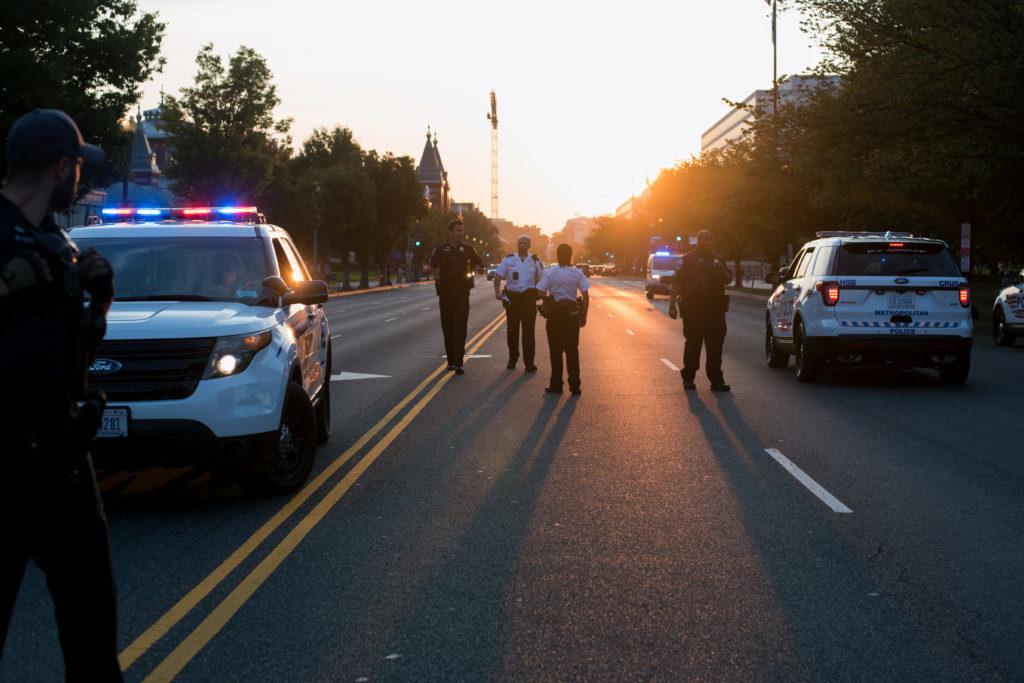The D.C. Council passed police reform legislation Tuesday, removing power from police unions for disciplinary action and banning the hiring of officers with a history of misconduct.
The bill bans the use of chokeholds, the neck restraint ex-officer Derek Chauvin used to kill George Floyd last month, and requires the Metropolitan Police Department to disclose an officer’s name and body-camera footage within 72 hours of an arrest using “serious force,” according to a summary of the bill. The Council passed the bill unanimously and outlined a slew of new provisions officials hope will begin to answer District residents’ calls against systemic racism within police departments across the nation.
Ward 6 Councilmember Charles Allen, who spearheaded the bill, said in a statement on his website the Council’s new legislation is not the end of the city’s push to topple systemic failures within law enforcement. He said the Council will deliberate Mayor Muriel Bowser’s Fiscal Year 2021 budget at a hearing next week, which some D.C. residents have rebuked, urging officials to defund or abolish the police department.
“We have an opportunity and an obligation to try and meet this moment, and working with many of my colleagues, we’ve crafted a strong package,” Allen said in the statement. “But I want to make clear that this isn’t the end of reforms. The emergency legislation is one act we can take, along with many others through the budget and further legislative reforms.”
Bowser said Wednesday she plans to sign the bill into law.
The Council’s Committee on the Judiciary and Public Safety will debate Bowser’s FY 2021 budget at a hearing Tuesday to decide if officials should withdraw funding from the proposed $580 million allocation to MPD, according to a DCist report. The meeting will determine whether councilmembers will respond to protesters who have pressured D.C. leadership to defund the police department and redirect money to other city resources like education and affordable housing, DCist reported.
The emergency legislation passed Tuesday bans MPD from hiring officers with a history of misconduct and strips power from the D.C. Police Union, which has been responsible for disciplining its own officers in past years, what many believe has served as a caveat to firing officers, according to The Washington Post. Union officials released a statement following the council’s vote, condemning the reform that removes their previous responsibility.
“What we saw today was a disservice to the citizens of the District of Columbia, who have been plagued with violent crime for years,” union leaders said in the statement. “There is no need for this type of sweeping reform to be completed in such a hasty and unthoughtful manner.”
D.C. Council Chair Phil Mendelson told The Post the city would authorize the “police disciplinary process” against MPD officers once the department’s contract with the union expires in September.
The bill’s reforms prohibit MPD from buying military-grade equipment like armored vehicles, drones and grenades from the federal government and ban the use of tear gas “and other militarized gear” when controlling crowds, according to the bill’s summary. The summary states the bill also defines clear standards that limit the use of deadly force and requires officers to undergo special training on racism and white supremacy and other guidelines to follow on duty.
Under the new changes, the summary states members of the Office of Police Complaints must be unaffiliated with MPD and include representatives from each ward in the District. The office’s executive director also receives authority to investigate instances of abuse of police power within MPD, according to the summary.
The summary states the bill also allots legal protections to people who the police ask to consent to searches, grants voting rights to felons in D.C. jails and guarantees a trial by jury to anyone accused of assaulting an officer.
A new Police Reform Commission of 20 people will submit a report by the end of the year that reviews the success of these new measures to reform the MPD, according to DCist.
At-Large Councilmember David Grosso said the Council should institute a new MPD officer cap of no more than 3,500 officers – a drop from the 3,863 currently serving on the police force, according to the DCist report. The report states Grosso failed to convince enough of his fellow councilmembers to pass the reform, as other councilmembers felt a push to defund MPD would be more effective in responding to the issues that protesters have pressed officials to address.







